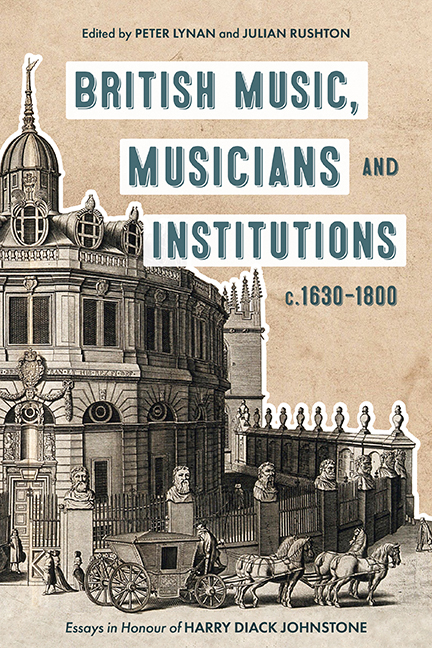Book contents
- Frontmatter
- Contents
- List of Illustrations
- List of Music Examples
- List of Contributors
- Acknowledgements
- List of Abbreviations
- Note to the Reader
- Introduction
- Part I Performers and Performance Style
- Part II Composers and Secular Institutions
- Part III Sacred Music and Institutions
- Part IV Dissemination: Copying, Printing, and Publishing
- Epilogue: Musica Britannica and the Eighteenth Century
- Harry Diack Johnstone: A Tribute
- Bibliography of the Publications of Harry Diack Johnstone
- Index
- Tabula Gratulatoria
1 - Henry, Elizabeth, and George: New Light on Music at Wilton House in the 1770s
Published online by Cambridge University Press: 06 October 2022
- Frontmatter
- Contents
- List of Illustrations
- List of Music Examples
- List of Contributors
- Acknowledgements
- List of Abbreviations
- Note to the Reader
- Introduction
- Part I Performers and Performance Style
- Part II Composers and Secular Institutions
- Part III Sacred Music and Institutions
- Part IV Dissemination: Copying, Printing, and Publishing
- Epilogue: Musica Britannica and the Eighteenth Century
- Harry Diack Johnstone: A Tribute
- Bibliography of the Publications of Harry Diack Johnstone
- Index
- Tabula Gratulatoria
Summary
Elizabeth Herbert, Countess of Pembroke, wife of Henry, tenth Earl of Pembroke, is best known to music history for owning a number of manuscripts of Charles Frederick Abel's viola da gamba music. A scrapbook of seven separate items assembled in the nineteenth century has the statement on f. 2 that it was ‘formerly the Music Book of the Countess of Pembroke’; and item 4, the autograph of the unaccompanied Sonata in G major A1:3 (formerly WKO 155), is annotated by a later hand on f. 8 ‘Composed for the Lady Pembroke / The original Manuscript’. Her signature appears on f. 45, the front cover of item 7, the second of two sets of Abel's sonatas for gamba and bass seemingly copied for her by an unidentified individual in the 1770s. A second collection of Abel's gamba music that she owned came to light in 1994. It is another scrapbook of separate manuscripts bound together, in this case containing eight sonatas for gamba and bass and four duets for gamba and violoncello, copied by Abel himself and an unidentified assistant; the signature ‘Eliz. Pembroke’ appears on the first page. These signatures can be authenticated by comparing other samples of her handwriting.
Given that Elizabeth was a high-profile aristocrat whose activities would have generated a large volume of financial and administrative documents, and whose circle included some prolific letter writers and diary keepers, it is strange that almost no documentary evidence of her gamba playing has come to light – apart of course from her music manuscripts. I tried to change that while working on my book Life after Death by reading everything I could find about Elizabeth and Henry, and by searching their family papers formerly at Wilton House, the Pembroke estate near Salisbury. They are now in the Wilton House Archive at the Wiltshire and Swindon History Centre in Chippenham.
We shall see that this has revealed a good deal of new information about musical life at Wilton in the 1770s, although, to cut a long story short, there seems to be only one documentary reference to Elizabeth's gamba playing, in the Harris family papers rather than in the Wilton House Archive.
- Type
- Chapter
- Information
- British Music, Musicians and Institutions, c. 1630-1800Essays in Honour of Harry Diack Johnstone, pp. 9 - 31Publisher: Boydell & BrewerPrint publication year: 2022



